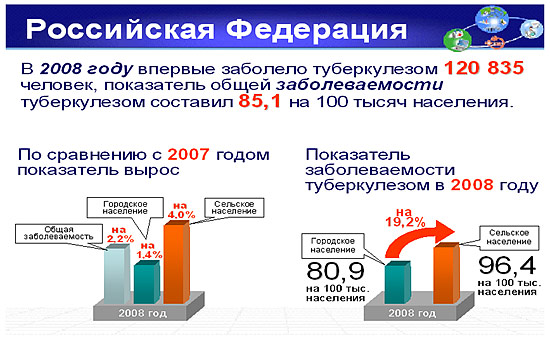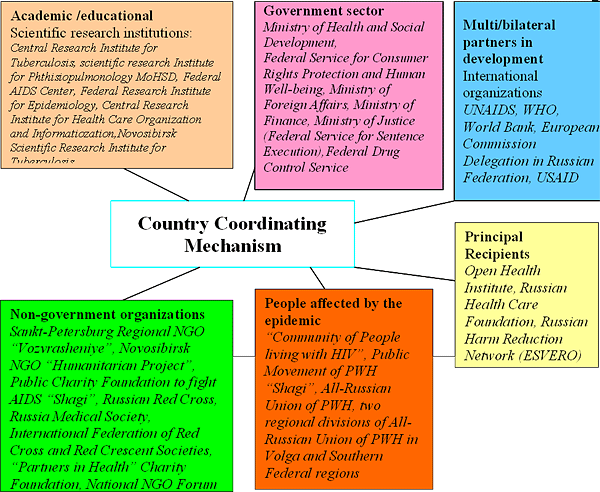 |
| ИНФОРМАЦИЯ
| |||||||||||||||||||
The fight against HIV/AIDS and tuberculosis: Country Coordinating Mechanism in actionChair of Country Coordinating Mechanism in the Russian Federation — Pokrovsky Valentin Ivanovich, Doctor of Medical Sciences, professor, winner of Russian State and government Awards in sciences and techniques, Awards from the Russian Academy of Sciences and Russian Academy of Medical Sciences, academician of Russian Academy of Sciences and Academy of Medical Sciences, Director of Federal Research Institute for Epidemiology. The growth of HIV/AIDS, tuberculosis and malaria that lead to permanent loss of ability to work and premature deaths, is the priority problem of the international community. Tuberculosis and malaria mortality remains high, and AIDS mortality continues to grow. According to World Health Organization, the number of death cases from malaria is 1,1 — 1,3 million per year. HIV statistics worldwide, estimated(UNAIDS/WHO, 2009)
Worldwide statistics on TB(estimated, WHO 2009)
TB is a leading killer of people with HIV. In 2008, WHO reported the biggest growth of multi-drug resistant TB (MDR-TB). 5% of all TB cases have MDR-TB. 8 million deaths were averted in 2008 by using Directly Observed Treatment Strategy (DOTS). TB data for Russian Federation, all cases(WHO RF Country profile, 2007)
Russian Federation is among 5 top countries with the largest number of TB cases (WHO, 2008). In 2009, 214 924 TB patients were registered for treatment.
Federal center for monitoring tuberculosis control provides the following data:Decrease in the diagnosed TB cases is caused by economic problems in the country and weakening of medical care services. This is confirmed by the increase in registration of destructive forms of TB. Treatment efectiveness remains low: 58,9% в 2008 , and 57,6% — in the first three quarters of 2009. Most of Russian territories are below the threshold of 40% for efficacy of treatment, which is the level of natural self cure. The causes are: 1) early haltering of treatment (9,7%); 2) high mortality during treatment. Within the first year of therapy, almost 9,2% of patients die. This is caused by late diagnosis and late start of treatment, when lung destruction occurred ; 3) the high proportion of multi drug resistant forms (MDR-TB). Spread of MDR-TB is a serious threat. In 2007, MDR-TB was diagnosed in 13% of all new cases of TB, and in 49% of previously treated cases (WHO, Country profile, 2007). In 2008, the diagnosis of MDR-TB was confirmed in 13,6% of all newly infected patients and in 50,2% of previously treated patients; mortality from TB was 17,9 per 100 000 population. A great part of TB patients are in the penitentiary system. In 2008, of 270 544 registered TB patients, 24 302 patients came from penitentiary institutions. Major challenges include high rates of MDR-TB among new and previously treated cases combined with an inadequate supply of second-line drugs, poor infection control in TB units and laboratories, and a shortage of appropriately qualified staff (WHO RF Country profile, 2007). The significance of TB infection increases with HIV spread and growth in the number of combined HIV/TB cases. Tuberculosis in HIV patients significantly worsens the prognosis and leads to increase in mortality from TB. HIV data in the Russian Federation (Federal AIDS center, 2009)
The number of people with HIV in Russia is constantly growing, and by 31.12.2009, 516 167 people have been registered with HIV(Federal AIDS Center). According to WHO/UNAIDS, the real number of HIV cases in Russia is approaching 1 million. 11% (48 000) of all people registered with HIV, and 14% of all people with TB are in prisons (Federal Service for Sentence Execution, 2008). Despite the efforts from the Russian government and international organizations, the number of new HIV cases grows constantly, and the mortality from this infection starts to grow sharply in relation to a growing number of AIDS patients. Federal AIDS center provides the following data:The number of people diagnosed with AIDS and HIV/AIDS-related deaths are increasing sharply. In 2008, 12 759 of HIV-infected Russian citizens died, compared to 2005 — 6 122 (National priority project «Health»). In the end of 2008, total 11 783 AIDS patients were registered; one third of them (3848) got registered in 2008 alone. Of all AIDS patients who were registered in 2008, 2743 patients died. 13% of all people registered with HIV needed antiretroviral therapy in 2008 (National priority project «Health» data). However, estimated 25% of all people registered with HIV are in need for treatment, and for different reasons (generally related to registration issues in the place of living and belonging to hidden (vulnerable) groups ), do not receive therapy. Public Health has effective tools to prevent and treat AIDS, TB and malaria. Their utilization on a large scale would change the course of the epidemics. However, a marked increases in resources is necessary to achieve this. At the meeting in 2000, the G8 leaders announced of their acknowledgement of the need to mobilize the resources to fight HIV/AIDS, TB and malaria. Special session of the UN General Assembly (July of 2001) completed with the Resolution to create the Global Fund to fight AIDS, Tuberculosis and Malaria (GF) that would become the mechanism to mobilize additional funding. At the meeting in Genoa in July of 2001, the leaders of the G8 countries made a decision to direct financial resources to GF. The main goal of the Global Fund is to mobilize the resources for the fight against AIDS, TB and malaria, manage them and distribute them to the territories in most need. The Global Fund creates partnership between governments, civil society, private sector and vulnerable populations, affected communities; works in close collaboration with other multi- and bilateral organizations in health care and development, coordinates the new programmes with already existing. The GF budget is formed of resources provided by donors: countries and organizations. GF funds the activities and programmes on a competitive basis, after a thorough review of the applications — project proposals sent from the countries most in need for assistance to fight the epidemic of these dangerous diseases. The applications are sent from countries to the Fund through Country Coordinating Mechanisms (CCMs), in which different sectors of the society must be represented: government and non-government organizations, civil society institutions, multi- and bilateral partners, people affected by HIV/AIDS and tuberculosis, academic institutions, as well as private sector representatives. CCM must be represented at the high national level, of officials responsible for national planning. Country Coordinating Mechanism selects and appoints Principal (main) Recipients (PR) of the grants. According to GF rules, PRs must be independent organizations with the experience in large projects implementation. After receipt of the grant, Principal Recipient implements the programme submitted to GF by CCM. In 2003, in Russian Federation, a national collective coordinating and advisory body was created — County Coordinating Mechanism to fight HIV/AIDS and tuberculosis epidemic in Russian Federation (CCM). It was chaired by president of Russian Academy of Sciences academician V.I.Pokrovsky. He chairs the CCM in the present. Deputy Minister of Health and Social Development of the Russian Federation, academician V.I.Starodubov became CCM vice Chair in 2004. CCM includes 33 member organizations, which appoint 33 CCM member representatives.Representatives of different interested organizations participate in CCM meetings as advisors, observers and experts. CCM member organizations represent different sectors of the Russian society and international partners.
Academicians of Russian Academy of Medical Sciences M.I.Perelman, V.I.Pokrovsky, V.I.Starodubov, V.V.Pokrovsky are CCM members. CCM Secretary carries out administrative support of CCM activity, organizes regular meetings of CCM members, advisors and observers, prepares the agenda, protocols of the meetings and ensures participation of CCM members representing all sectors of the society in discussions and CCM decisions. UNAIDS and the Global Fund Secretariat provide administrative, technical and financial support to CCM. CCM is a voluntary public group. In its activities it is guided by Russian Federation laws, CCM statute and Global Fund recommendations. CCM meetings are held on a regular basis no less than 6 times per year. Since its creation, CCM has played a leading role in the country’s national response to theHIV an TB epidemic. CCM coordinated the application for the Global Fund Round 4 «Promoting a Strategic Response to HIV/AIDS -Care and Treatment for Vulnerable Populations in the Russian Federation» and «Promoting a Strategic Response to tuberculosis -Care and Treatment for Vulnerable Populations in the Russian Federation». As a result of a competitive selection by GF, the CCM Russian Federation application was approved for funding with $210 million from the Global Fund to fight HIV/AIDS and tuberculosis. By 01.01.2010, within the GF funded Round 4 programme, cumulative 38 040 patients have received combined antiretroviral therapy; 5964 patients with multi-drug resistant tuberculosis have been receiving therapy with the second-line drugs. In the 4 years of the programme, 139 339 tuberculosis patients have been receiving a complex social support within treatment adherence projects. As a result of the effective measures for improving diagnosis and treatment, a reduction in TB mortality since 2005, and a decrease in prevalence of smear-positive TB cases since 2002 have been achieved. Core CCM functions are to support preparation, review and submission of new applications to the Global Fund, grant oversight and control of effective implementation of the grants received, in accordance with the Global Fund requirements. В In Russia, the following GF grants are under implementation:
Principal recipients of the GF grants are Open Health Institute (Round 3), Charity Foundation «Partners in Health» (Round 3), Russian Health Care Foundation (Round 4), Russian Harm Reduction Network (ESVERO, Round 5). The Global Fund grants are disbursed to Principal Recipients; however, CCM discusses all strategic questions (for example related to applications discussion, or changes in the applications/implementation plans). In all cases PR seeks CCM approval. All grant recipients report to CCM on a regular basis on the implementation of projects supported by GF. CCM assists in coordination of activities within Federal and regional programmes and GF Rounds 3, 4, and 5 projects, as they are implemented also by non government organizations together with the state services. CCM oversees the utilization of grants received, coordinates measures to increase the return of funds invested, with the goal to increase the number of the population receiving support, and assure the quality of services in all projects. Within the Round 4 project, in 59 regions of the country, an integrated system for prevention, treatment, care and support in HIV/AIDS and tuberculosis was created at the national level. In the framework of the funding received, a wide scope of activities are undertaken for capacity building of the Russian health system in HIV/AIDS and TB; early diagnosis, effective treatment, care and support for PWH and TB patients; a large scale system for staff education; complex outreach programmes are diversified; HIV mother-to-child transmission prevention has been introduced as a standard of care for HIV positive pregnant women; the system for procurement management and supply of antiretroviral and antituberculosis drugs; the price reduction strategy is introduced for antiretroviral drugs; the system for laboratory diagnosis is strengthened; surveillance of HIV and TB, monitoring drug resistance; applied research programmes in improving access to treatment and care — are supported through the GF grants. Country Coordinating Mechanism participates in development of the basic documents in HIV/AIDS and tuberculosis. The draft National Concept of response to HIV/AIDS epidemic, the indicators of the universal access to HIV prevention, treatment, care and support were drafted, discussed and approved at CCM meetings. Projects coordinated by CCM, support and complement Federal programmes in HIV/AIDS and tuberculosis: subprogramme "Anti HIV/AIDS of Federal programme «Prevention of socially significant diseases The funds of Round 4 project coordinated by CCM are directed to the regions of the country, with the highest prevalence of HIV and TB, and are aimed to the spheres of the response to the epidemic not funded adequately by the state programmes. These are, in the first instance, prevention activities, and projects directed towards vulnerable, hard to reach and hidden populations (drug users, commercial sex workers, people in penitentiary institutions etc.). Other fields in which | СКМНовости
|
| © 2007-2026, Федеральный | ||


